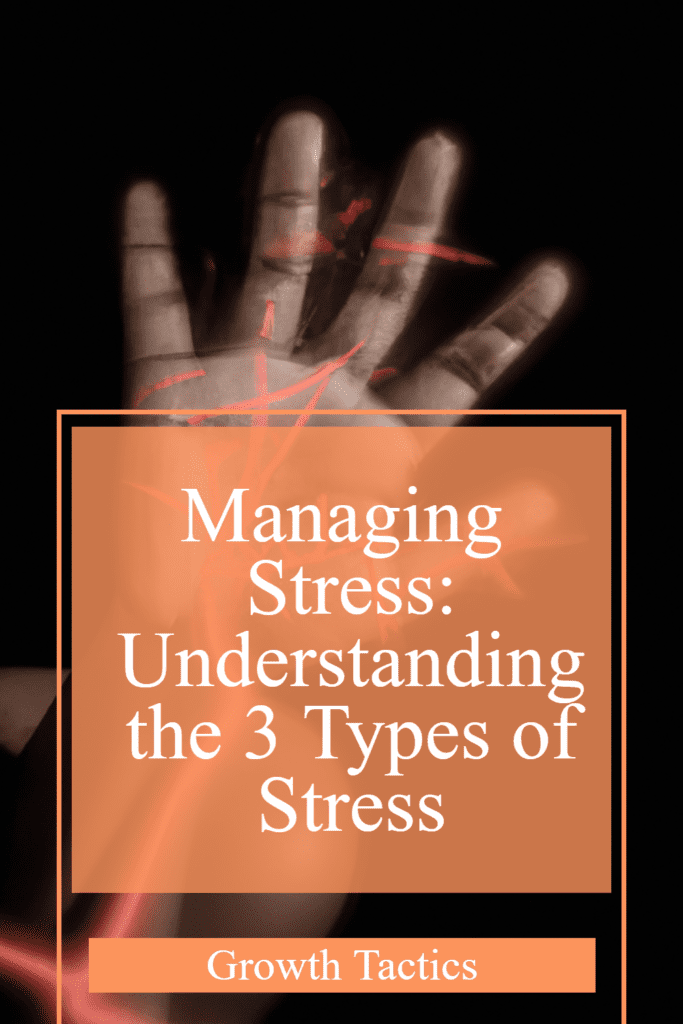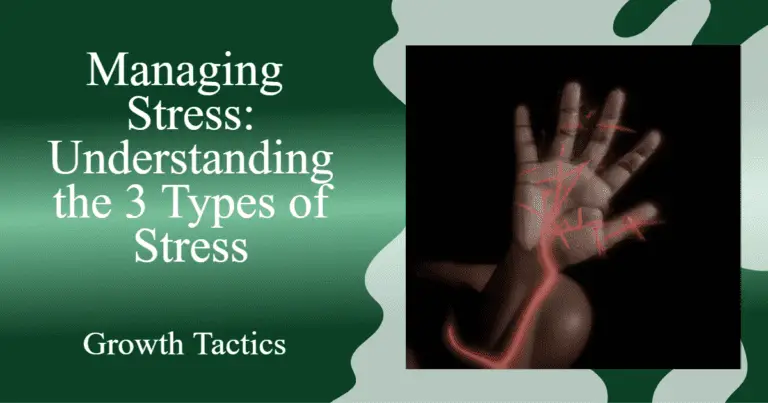In this article, we will explore the different types of stress that individuals experience in their daily lives. We will delve into the symptoms, causes, and effects of stress, while also providing valuable insights on stress management techniques. Whether you are dealing with acute stress, chronic stress, or episodic acute stress, this article will equip you with the necessary tools to effectively cope with stress and maintain your physical and mental well-being.
Jump To Section
Types of Stress: Your Guide to Understanding Pressure
Stress comes in different forms, and I’ve found that knowing these types can really help you manage your life better. Let’s break it down into three main types that I’ve experienced and seen in others.
Acute Stress
This is the most common type of stress. It’s like a sudden burst of energy that doesn’t last long. I’ve felt this when:
- Giving a big speech
- Having an argument
- Getting stuck in traffic
Acute stress can give you a boost to handle tough situations. But be careful! If it happens too often, it can wear you out.
Chronic Stress
Chronic stress sticks around for a long time. It’s like carrying a heavy backpack everywhere you go. I’ve seen this happen with:
- Money problems that don’t go away
- Tough relationships
- Long-term health issues
This type of stress can really hurt your body and mind. It might lead to high blood pressure or feeling sad all the time.
Episodic Acute Stress
Some people seem to always be in a hurry. They’re busy all the time and have too much to do. This can lead to:
- Feeling worried a lot
- Having trouble with friends and family
- Not doing well at work
To break this cycle, you need to find ways to cope and make some changes in your life.
Remember, everyone deals with stress differently. What works for me might not work for you. The key is to find your own path to handle stress. It’s all about taking charge of your life and finding your purpose in everything you do.
Symptoms of Stress: Listen to Your Body and Mind
I’ve learned that knowing the signs of stress is key to beating it. Stress can show up in how you feel and how your body acts. Let me share some common symptoms I’ve seen in myself and others:
Physical Signs:
- Your heart races
- You get headaches more often
- Your stomach feels upset
- Your muscles are tense
- You’re always tired
- You can’t sleep well
Emotional Signs:
- You feel cranky or annoyed easily
- Your mood changes a lot
- You worry more than usual
- You feel sad or down
- Focusing on tasks is difficult
- You lose interest in things you used to enjoy
Knowing these signs is just the first step. Everyone deals with stress differently. The most important thing is to take action when you notice these signs. Your well-being matters, and dealing with stress is a big part of living a good life.
Effects of Stress
Indeed, the effects of stress can be far-reaching and impact many aspects of our lives. Here are some ways stress can affect us:
- Cognitive abilities: Stress can affect our ability to think, learn, remember, and focus, impairing our cognitive abilities and making it harder to complete tasks.
- Decision-making skills: Stress can also impair our decision-making skills, making it harder to make sound decisions and leading to poor choices.
- Sleep patterns: High levels of stress can affect our sleep patterns, making it harder to fall asleep or stay asleep, and leading to insomnia or other sleep disorders.
- Relationships: Stress can also strain relationships with family, friends, and coworkers, leading to increased conflict, communication breakdowns, and social isolation.
- Physical health problems: Long-term stress can also have negative physical effects on our health, including high blood pressure, heart disease, digestive issues, and weakened immune systems.
Causes of Stress
Stress can indeed arise from various sources, and identifying the causes of stress in your life is crucial for effective management. Here are some common sources of stress:
- Work-related pressures: Deadlines, a heavy workload, demanding colleagues or managers, and job insecurity can all contribute to work-related stress. Finding ways to manage your workload, setting boundaries, and practicing effective time management can help alleviate this type of stress.
- Financial difficulties: Money concerns, such as debt, unemployment, or the inability to meet financial obligations, can be highly stressful. Creating a budget, seeking financial advice, and exploring ways to increase income or reduce expenses can help alleviate financial stress.
- Relationship problems: Conflict, poor communication, or troubled relationships with friends, family members, or romantic partners can be significant sources of stress. Seeking counseling, improving communication skills, setting boundaries, or making necessary changes in relationships can help reduce relationship-related stress.
- Major life changes: Significant life events, such as moving, getting married or divorced, having a baby, or experiencing the loss of a loved one, can create significant stress. Developing a support network, seeking professional help, and practicing self-care during these times of change can help manage stress.
- Health conditions: Dealing with chronic illness, injury, or managing a loved one’s health issues can be incredibly stressful. Seeking medical help, following a treatment plan, and practicing self-care and stress-reducing techniques can help manage stress related to health conditions.
By identifying the specific causes of stress in your life, you can develop strategies to reduce or eliminate these stressors. This may involve seeking support, making lifestyle changes, setting boundaries, or implementing stress management techniques such as exercise, mindfulness, or relaxation techniques. Remember, managing stress is a personal journey, and finding what works best for you is key to improving your overall well-being.
Stress Management
I’ve learned that managing stress is key to living well. We all deal with stress differently, but I’ve found some ways that really work. Let me share what I’ve learned:
Make Time Work for You
I used to feel like time was my enemy. Now, I make it my friend. Here’s what I do:
- I list what’s important
- Also, I set goals I can reach
- Furthermore, I break big tasks into smaller ones
This helps me feel like I’m winning, and it really cuts down on stress.
Move Your Body
Exercise is my go-to stress buster. When I’m feeling overwhelmed, I:
- Go for a quick walk
- Do some stretches
- Dance to my favorite song
It always makes me feel better. The good feelings from exercise are real, and they help push the stress away.
Eat Well to Feel Well
What we eat matters. I’ve noticed that when I eat better, I handle stress better. I try to:
- Eat more fruits and veggies
- Drink plenty of water
- Cut back on junk food
It’s not always easy, but it makes a big difference in how I feel.
Sleep: Your Secret Weapon
I used to think I could get by on little sleep. I was wrong. Now, I make sure to:
- Go to bed at the same time each night
- Keep my bedroom dark and quiet
- Avoid screens before bedtime
Getting enough sleep helps me face each day with more energy and less stress.
Reach Out to Others
We’re not meant to go it alone. When stress gets too much, I:
- Call a friend
- Talk to my family
- Sometimes, I even talk to a professional
There’s no shame in asking for help. It often makes me feel better just to talk things out.
Remember, what works for me might not work for you. The key is to try different things and find what fits your life. It might take some time, but it’s worth it. Managing your stress can make your whole life better. So, give these ideas a try and see what works best for you. You’ve got this!ions.
Physical and Mental Health
Stress can have a profound impact on both physical and mental health. Prolonged exposure to stress can lead to various health issues such as high blood pressure, heart disease, weakened immune system, digestive problems, and mental health conditions like anxiety and depression. It is crucial to prioritize self-care and adopt healthy coping mechanisms to mitigate the negative effects of stress on your overall well-being.
Stress and Anxiety
Stress and anxiety often go hand-in-hand, and individuals who experience chronic stress are more susceptible to developing anxiety disorders. It is important to address both stress and anxiety to maintain optimal mental and emotional well-being. Strategies such as therapy, relaxation techniques, and stress management techniques can greatly help in reducing stress and anxiety levels.
Takeaway
- Identify the different types of stress you may be experiencing in your life.
- Recognize the symptoms of stress to effectively manage it.
- Implement stress management techniques that work best for you.
- Identify the causes of stress in your life and develop strategies to reduce or eliminate them.
- Prioritize your physical and mental health by engaging in self-care activities.
- Seek professional help if needed.
- Remember, managing stress is essential to maintaining a balanced and healthy lifestyle.
Remember to prioritize self-care and seek help when needed to effectively manage and reduce stress in your life.
FAQ
Q: What is acute stress?
A: Acute stress is short-term stress. It’s what you feel when you’re running late for a meeting or about to give a speech.
Q: How does acute stress affect me?
A: You might feel your heart race, your palms sweat, or your stomach tighten. These are normal reactions.
Q: Is acute stress always bad?
A: Not always. Sometimes it can help you focus and perform better. I’ve had moments where acute stress pushed me to do my best.
Q: What is chronic stress?
A: Chronic stress lasts for a long time. It might come from a tough job, money problems, or a difficult relationship.
Q: How can I tell if I have chronic stress?
A: You might feel tired all the time, have trouble sleeping, or feel sad or angry a lot. I once had a job that gave me chronic stress, and I felt drained all the time.
Q: Can chronic stress be dangerous?
A: Yes, it can be. It might lead to health problems if you don’t address it. That’s why it’s important to find ways to manage it.
Q: What is eustress?
A: Eustress is positive stress. It’s the excitement you feel when you’re doing something challenging but fun.
Q: Can you give an example of eustress?
A: Sure! For me, it’s the feeling I get when I’m learning a new skill or planning a trip. It’s exciting and a bit nerve-wracking but in a good way.
Q: Is eustress important?
A: Absolutely! Eustress can motivate you and help you grow. I always try to find ways to add positive challenges to my life.


